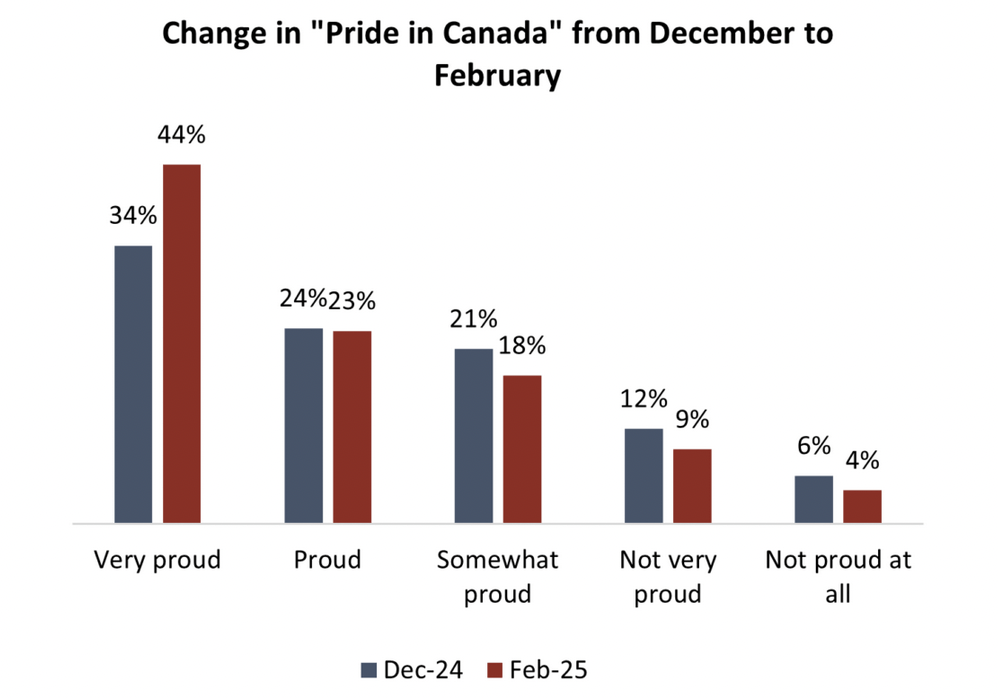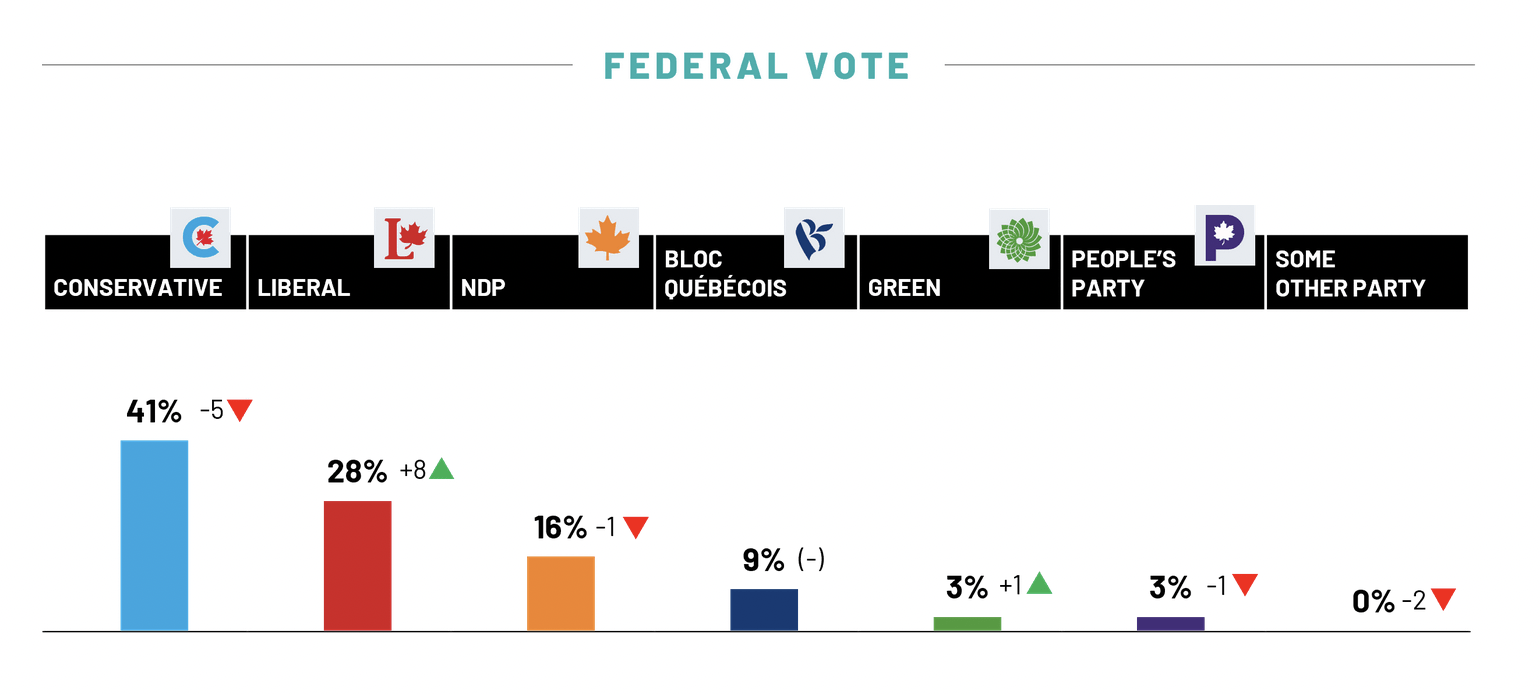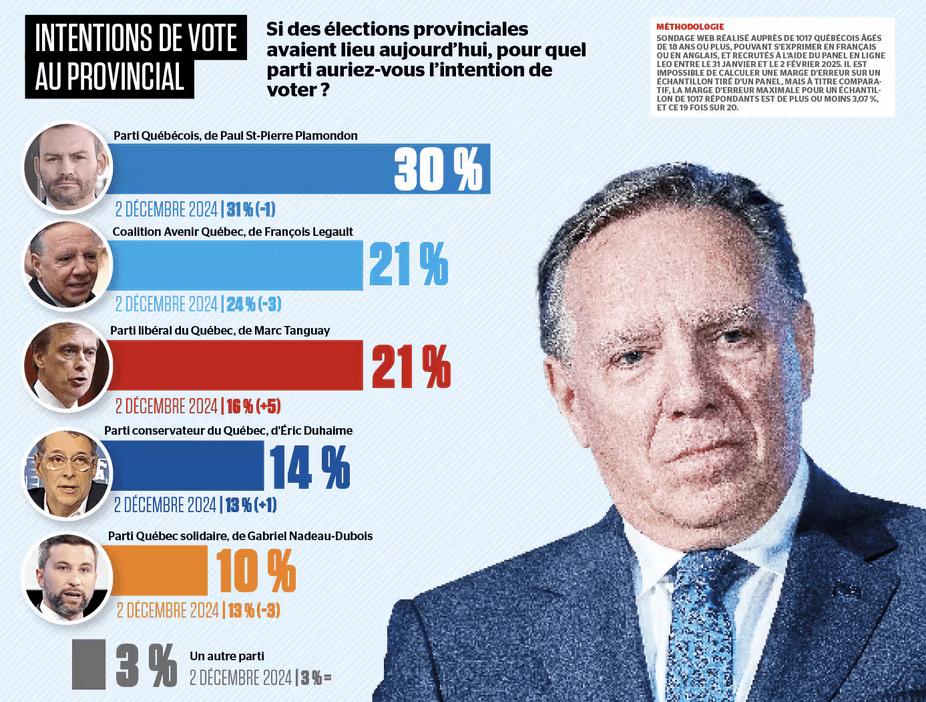Canadians Roused by Grunting Elephant: Trump, Patriotism, and Politics

By Daniel Béland
February 6, 2025
As the federal Liberal leadership campaign evolves in tandem with what is arguably the strangest episode in Canada-US relations ever, Donald Trump’s effect on both narratives is translating to a surge in both overt Canadian patriotism and the Liberal Party’s fortunes, especially in Quebec.

On Wednesday, the Angus Reid Institute reported (above) a 10-point jump in the number of Canadians who say they are “very proud” of their country compared to just two months ago. The same increase was noted among those who say they have a “deep emotional attachment to Canada”, which has risen from 49% to 59%. Most notably, the province/region that recorded the most dramatic surge in emotional attachment to Canada was Québec, from 30% to 45% of respondents since December.

Meanwhile, on Thursday, Ipsos reported (above) a tightening in federal voter intention between the leading Conservatives and what has been a beleaguered Liberal Party, with the Liberals gaining 8 points since January for 28%, and the Conservatives losing 5 to 41%.
And, in a Quebec-only Léger poll released Thursday for the Journal de Montréal, the Liberal Party under Justin Trudeau is polling at 29%, and at 38% under Mark Carney.
Back in 1969, during a visit to Washington, DC, Prime Minister Pierre Trudeau famously described Canada-U.S. relations in these terms: “Living next to you is in some ways like sleeping with an elephant. No matter how friendly and even-tempered is the beast, if I can call it that, one is affected by every twitch and grunt.”
Even more than during the first Trump presidency, Canada is now sharing its continental bed “with a very cranky elephant”. While Canadian and U.S. politics have long been intertwined, Trump’s second term is already shifting the political agenda at both the federal and the provincial levels, so much so that he is now a central figure in electoral politics and leadership races.
This is the case because Donald Trump’s tariff threats and his talk of making Canada the 51st state have rightly upset many Canadians, who are concerned about the impact of the president’s bullying on their country’s economy and overall future
This surge in Canadian patriotism was evident in the weeks that preceded the release of these polling results. In mid-January, in the context of ongoing Trump tariff threats ahead of Inauguration Day, Ontario Premier Doug Ford showed up in public with his new “Canada is not for sale” baseball cap, which became an immediate hit. Surfing on this patriotic wave, less than two weeks later, he triggered provincial elections and launched a “Captain Canada” campaign centred on fighting back against Trump’s tariff threat.
Earlier this week, however, the President paused his threat for 30 days after Prime Minister Justin Trudeau made minor concessions such as the appointment of a “fentanyl czar.” This sudden development provided an opportunity for the provincial New Democratic Party (NDP) and the Ontario Liberal Party to shift the attention of the campaign towards “domestic” issues such as housing and health care they think are harder to handle for Progressive Conservatives.
The importance of the Trump effect is also ever-present in the rhetoric of two main contenders in the Liberal leadership race, Chrystia Freeland and Mark Carney.
At the federal level, the prospect of a tariff war with the United States has created clear challenges for Pierre Poilievre and the Conservatives, who have long sought to make the next federal campaign about cost-of-living and fiscal matters, including and especially the federal carbon tax. In the face of Trump’s tariff threats, however, the Conservative leader has surrounded himself with Canadian flags while stressing the need to put Canada First.
Yet, although there is now a strong sense that the next federal election will be about Canada-U.S. relations and how to deal with the very cranky elephant in the White House, Poilievre cannot stop emphasizing “axe the tax” in his public and social media statements, as if he did not want to acknowledge that the advent of the second Trump presidency has profoundly shifted the national conversation across the country.
Although Trump’s tariff threats and bullying are a foreign-policy nightmare for the Liberal government of lame duck Justin Trudeau, they have also provided an opportunity for the Liberals to reframe the political agenda around Canadian patriotism and how to best address the Trump menace.
The importance of the Trump effect is also ever-present in the rhetoric of two main contenders in the Liberal leadership race, Chrystia Freeland and Mark Carney. On the one hand, Freeland, who dealt with the first Trump administration and was deeply involved in Canada-U.S. trade negotiations in 2017-2018, recently went on several U.S. news networks to explain to Americans why President Trump’s proposed tariffs are “a really bad idea” while celebrating the long friendship between the two countries.
By appearing on these networks and speaking directly to Americans, she is suggesting that she knows how to engage with our southern neighbours to find common ground and reject President Trump’s belligerent approach. On the other hand, as Shannon Gormley points out, Carney has adopted a much less diplomatic tone than Freeland. Attacking the Republican president, he emphasizes that “Canadians are in no mood — no mood — to make any concessions here” and warns Americans against Canada’s trade retaliations and how they could hurt their country.
Regardless of which approach might be the most effective politically and diplomatically, it is clear that both Liberal hopefuls are now campaigning more directly against President Trump than against each other. This is the case partly because they think Trump will also be the ballot question in the upcoming federal election.
While Trump’s tariff threats are reshaping both Ontario and federal politics, they are also impacting Quebec politics. This is the case because, as suggested by the Angus Reid poll, Quebeckers are now more likely to identify positively with Canada than just a few months ago, which is excellent news for the Liberal Party of Quebec (PLQ), the only true federalist party in the province.

According to the provincial politics Québec section of the new Léger poll, in the aftermath of the Trump tariff menace, support for sovereignty has declined to 29%, its lowest score in five years. Simultaneously, in the same context, the popularity of the PLQ increased by five points to 21%. Although the PQ remains ahead in the polls with 30% of support, the PLQ is now tied with François Legault’s Coalition Avenir Québec (CAQ) in second place, even if the Liberals still only have an interim leader and the identity of their next permanent leader will only be revealed on June 14.
Currently, federal MP Pablo Rodriguez is clearly in the lead of the PLQ leadership race. With the PLQ improving its position in the polls while support for sovereignty is in decline, perhaps other high-profile candidates will register to compete in this race before the April 11 deadline?
Even if this is not the case, partly because of the Trump threat, the PLQ suddenly looks more relevant now than it has ever been since its crushing defeat at the October 2022 elections. This is yet another example of how the advent and behaviour of the grunting, twitching elephant in the White House is having a profound impact on our domestic politics, both provincially and federally.
Daniel Béland is professor of political science and director (on leave) of the McGill Institute for the Study of Canada at McGill University.
